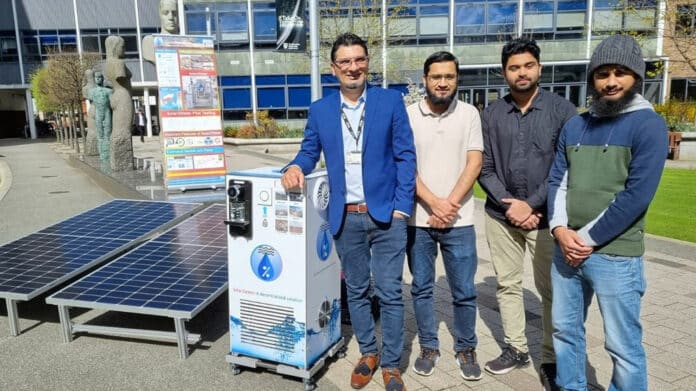Billions of people around the world still live without access to safe drinking water, sanitation, and hygiene services. This lack of access to water leaves communities across the globe exposed to water- and sanitation-related diseases. The problem is only worsening with climate change, conflicts, and population growth.
To help tackle water scarcity, researchers at Northumbria University have developed a sustainable solution for clean drinking water that can be deployed to rural communities and set up easily without scientific know-how.
The patented Solar2Water system is an innovative water production unit that uses solar energy to extract moisture from the air and turn it into clean, safe drinking water. Researchers say their system can produce a constant amount of water, regardless of the outside air humidity, and that it generates double the amount of water using the same amount of energy.
The system runs on solar energy alone and consists of two solar panels. Once unfolded, these panels begin harnessing energy from the sun to kick-start water production. A battery system stores energy during the day and releases it at night, which enables 24-hour operation, producing water for daily usage.
The Solar2Water can be operated in any environment and can produce water without the need for a body of water. Also, no training or experience is required to use the system. This allows it to be deployed quickly and easily to any location, such as disaster zones, field hospitals, offices, refugee camps, army camps, and remote communities without grid connection or water availability.
Dr. Muhammad Wakil Shahzad, who has been developing pioneering systems over the last decade, secured initial funding from the University to demonstrate the Solar2Water concept. After successfully developing the prototype unit in the lab, Dr. Shahzad was granted Proof-of-Concept funding from Northern Accelerator, an exciting collaboration between the North East’s universities, creating real-world impact from world-leading research, commercializing innovation, and boosting the region’s economy.
The pilot developed based on the Northern Accelerator PoC system can produce enough water for three to four households – 15 to 20 liters per day. But the team behind Solar2Water has plans to upscale the water production capacity to 50 liters per day so that one unit can produce enough drinking water for a small community.
The Proof-of-Concept funding is supporting the scaleup and commercialization of Solar2Water, with the ultimate aim of launching a university spinout company that could mass produce the units to supply to communities in need worldwide.
The new technology could be game-changing in helping to achieve sustainable water supplies in under-developed areas and will help to progress two of the UN’s Sustainable Development Goals – Zero Hunger and Clean Water and Sanitation for all.
